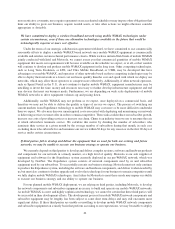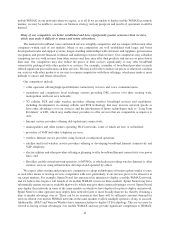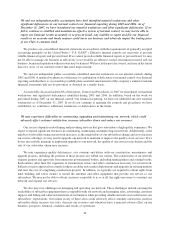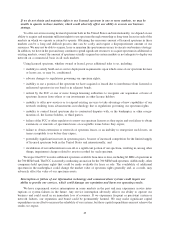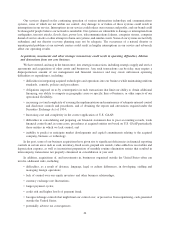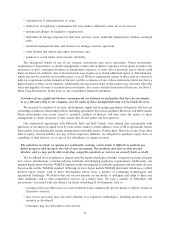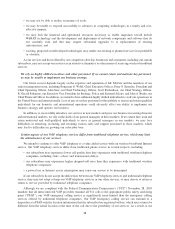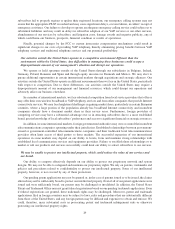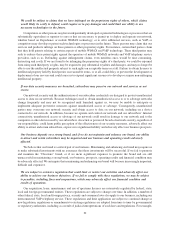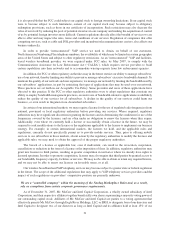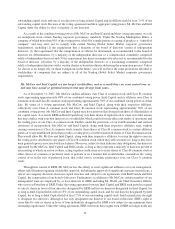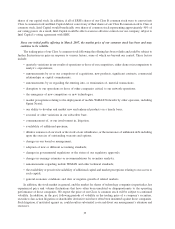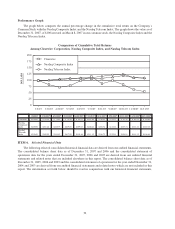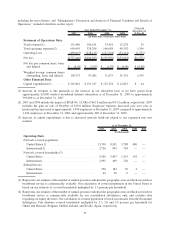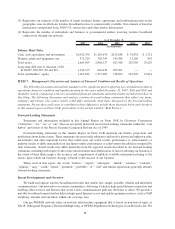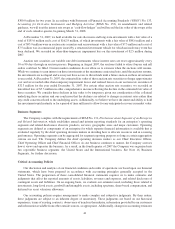Clearwire 2007 Annual Report Download - page 39
Download and view the complete annual report
Please find page 39 of the 2007 Clearwire annual report below. You can navigate through the pages in the report by either clicking on the pages listed below, or by using the keyword search tool below to find specific information within the annual report.it is also possible that the FCC could subject our capital stock to foreign ownership limitations. If our capital stock
were to become subject to such limitations, owners of our capital stock may become subject to obligatory
redemption provisions, such as those in our certificate of incorporation. Such restrictions may also decrease the
value of our stock by reducing the pool of potential investors in our company and making the acquisition of control
of us by potential foreign investors more difficult. Current regulations directly affect the breadth of services we are
able to offer and may impact the rates, terms and conditions of our services. Regulation of companies that offer
competing services, such as cable and DSL providers and incumbent telecommunications carriers, also affects our
business indirectly.
In order to provide “interconnected” VoIP service we need to obtain, on behalf of our customers,
North American Numbering Plan telephone numbers, the availability of which may be limited in certain geographic
areas of the United States and subject to other regulatory restrictions. As an “interconnected” VoIP and facilities-
based wireless broadband provider, we were required under FCC rules, by May 2007, to comply with the
Communications Assistance for Law Enforcement Act (“CALEA”), which requires service providers to build
certain capabilities into their networks and to accommodate wiretap requests from law enforcement agencies.
In addition, the FCC or other regulatory authorities may in the future restrict our ability to manage subscribers’
use of our network, thereby limiting our ability to prevent or manage subscribers’ excessive bandwidth demands. To
maintain the quality of our network and user experience, we manage our network by limiting the bandwidth used by
our subscribers’ applications, in part by restricting the types of applications that may be used over our network.
These practices are set forth in our Acceptable Use Policy. Some providers and users of these applications have
objected to this practice. If the FCC or other regulatory authorities were to adopt regulations that constrain our
ability to employ bandwidth management practices, excessive use of bandwidth-intensive applications would likely
reduce the quality of our services for all subscribers. A decline in the quality of our services could harm our
business, or even result in litigation from dissatisfied subscribers.
In certain of our international markets, we may require a license for the use of regulated radio frequencies from
national, provincial or local regulatory authorities before providing our services. Where required, regulatory
authorities may have significant discretion in granting the licenses and in determining the conditions for use of the
frequencies covered by the licenses, and are often under no obligation to renew the licenses when they expire.
Additionally, even where we currently hold a license or successfully obtain a license in the future, we may be
required to seek modifications to the license or the regulations applicable to the license to implement our business
strategy. For example, in certain international markets, the licenses we hold, and the applicable rules and
regulations, currently do not specifically permit us to provide mobile services. Thus, prior to offering mobile
services to our subscribers in those markets, absent action by the regulatory authorities to modify the licenses and
applicable rules, we may need to obtain the approval of the proper regulatory authorities.
The breach of a license or applicable law, even if inadvertent, can result in the revocation, suspension,
cancellation or reduction in the term of a license or the imposition of fines. In addition, regulatory authorities may
grant new licenses to third parties, resulting in greater competition in territories where we already have rights to
licensed spectrum. In order to promote competition, licenses may also require that third parties be granted access to
our bandwidth, frequency capacity, facilities or services. We may not be able to obtain or retain any required license,
and we may not be able to renew our licenses on favorable terms, or at all.
Our wireless broadband and VoIP telephony services may become subject to greater state or federal regulation
in the future. The scope of the additional regulations that may apply to VoIP telephony services providers and the
impact of such regulations on providers’ competitive position are presently unknown.
We are a “controlled company” within the meaning of the Nasdaq Marketplace Rules and, as a result,
rely on exemptions from certain corporate governance requirements.
As of December 31, 2007, Mr. McCaw and Intel Capital Corporation, a wholly owned subsidiary of Intel
Corporation, and their respective affiliates together beneficially own shares representing a majority voting power of
our outstanding capital stock. Affiliates of Mr. McCaw and Intel Capital are parties to a voting agreement that
effectively permits Mr. McCaw, through Eagle River Holdings, LLC, or ERH, to designate four of our directors and
Intel Capital to designate two of our directors as long as Intel Capital and its affiliates hold at least 15% of our
31



